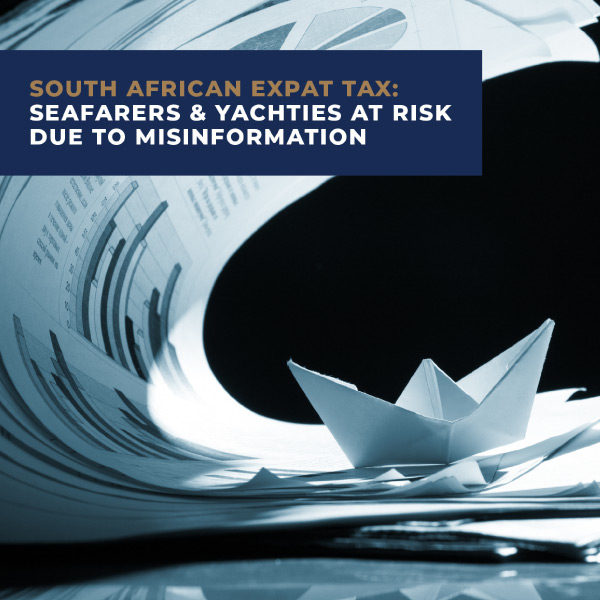SOUTH AFRICAN EXPAT TAX: SEAFARERS & YACHTIES AT RISK DUE TO MISINFORMATION
A made-up story
With all kinds of information regarding expatriate tax going around, seafarers and yachties (referred to jointly as seafarers hence forth) have been the ones who have been on the receiving end of the most confusing and contradicting guidance.
Articles have been written and advice has been given indicating that seafarers are not affected by the expatriate tax now imposed on South African tax residents working abroad, and therefore do not need to take measures such as ceasing tax residency. Unfortunately, the position of seafarers is not as simple as it has been made to seem.
Know the facts
It must be understood that only seafarers who are able to make use of the so called “seafarer’s exemptions” would be the ones who are not affected by the expatriate tax regime. This is due to the fact that the seafarer’s exemption does not automatically apply to every seafarer working on a boat or a yacht. Specific requirements need to be met to claim the exemptions in terms of 10(1)(o)(i)(aa) or section 10(1)(o)(i)(bb).
Being outside of SA for more than 183 days is not the only criteria that can be considered when exempting foreign earnings. All requirements under the below described sections need to be met to in order to claim under said section.
Under section 10(1)(o)(i)(aa) –
- The taxpayer must be an officer or crew member aboard the vessel; and
- Income received must be for foreign employment aboard a vessel; and
- The vessel must be involved in the international transportation of passengers/goods for reward; and
- The taxpayer must be outside of SA for more than 183 days for the year of assessment; or
Under section 10(1)(o)(i)(bb) –
- The taxpayer must be an officer or crew member aboard the vessel; and
- The vessel must be engaged in the prospecting, exploration or mining for any minerals or the production of any minerals from the seabed outside South Africa; and
- The taxpayer must be solely employed for the safe passage or navigation of the vessel; and
- The taxpayer must be outside of SA for more than 183 days for the year of assessment.
Therefore, should a seafarer not meet any of the above requirements, then they have the option of considering the foreign income employment exemption in terms of section 10(1)(o)(ii) and thus being affected by expatriate tax. Such a seafarer, subject to them meeting the requirements of this section, would be liable for tax in respect of foreign employment income earned exceeding R1,25 million.
The truth shall set you free
Financial Emigration is not an option that is openly available to each and every seafarer. Therefore, contrary to misinformed advice, the true experts in the field would not suggest it to a seafarer who has an intention to return to South Africa to consider financial emigration. Furthermore, it is important to note that the financial emigration process does not require individuals to sell or relocate all their financial assets. Individuals who have financially emigrated are still able to keep all assets that they have in or outside of the country.
It is important to note, however, that where a seafarer has a permanent intention to remain outside of South Africa, that they have the option of ceasing their tax residency as a whole. This is where Financial Emigration (“FE”) comes into play as it is a formal process through which an application is made to the South African Revenue Service and the South African Reserve Bank, which has been endorsed as the “right” way to go about it by South African parliament. This could be the case even where a seafarer meets the requirements to claim the exemptions described above.
This would mean that the seafarer is no longer obligated to declare all foreign income earned to SARS as at the date of FE and would only need to declare income insofar as it has a South African source. South African expatriate tax law on income earned abroad will no longer have any effect and there would be no South African tax liability on foreign income earned. Such an individual would then no longer need to go through the trouble of ensuring they meet the requirements of the abovementioned exemptions and further providing evidence and supporting documentation to prove their claim.
Seafarers have been incorrectly advised and misled to believe that ceasing your tax residency is not necessary and that financial emigration is nothing but a fruitless exercise. Of course, this information comes from a place of misunderstanding and ignorance on the purpose of ceasing tax residency and the related requirements. It is therefore important to dispel the rumours circulating about financial emigration.
It has further been said that instead of ceasing tax residency, seafarers should rather consider deregistering their tax number as this is supposedly a simpler option. Deregistering a tax number does not automatically exclude one from the tax base. Seafarers who have not ceased their tax residency are discouraged from deregistering their tax number as not having a valid tax number, where you are obliged to have one, is considered a criminal offence.
Get it right
Should you, as a seafarer or a yachtie, find yourself confused regarding the rules that apply to you and the options available to you, it is important that you do not find yourself in the trap of taking advice from untrusted sources and rather seek advice from known experts in the field of expatriate tax law.
AUTHOR

Reabetswe Moloi
Admitted Attorney



